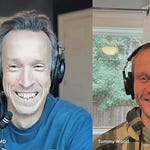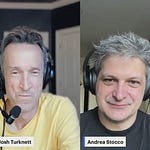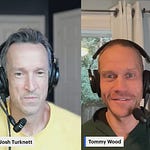We have two related questions that Tommy is going to address, which comes from Maria in Spain. Maria asks:
What are the benefits, if there are any, of fasting for brain health and longevity?
The second comes from Naomi in the UK, who asks:
I have recently started daily time restricted eating. Sometimes 18 hours fasted daily. I think my memory may have improved. Are there any negative effects of continuing this lifestyle? Could my improvement in memory be a coincidence?
(Have a question for us? Click here to submit it!)
To watch us answer this question, just click on the above video. To listen to it, click on our podcast feed below. To read it, just keep on scrolling…
Episode Transcript
Okay, welcome again to the Better Brain Fitness podcast. As usual, I am joined by my ketotic co-host, Dr. Tommy Wood. Hello, Tommy.
Hello, I did just have a very protein-rich breakfast, so I'm not sure how many ketones I've got kicking around.
And that was after breakfast and you fasted, so possibly you've got some ketones floating around.
How Physical Activity Affects Carbohydrate Tolerance in Ketosis
I do have a question for you, speaking of ketosis. And as a fairly muscular human, and an expert on ketosis, can you tell me how many extra grams of carbs per day a person can eat and still maintain ketosis for every extra pound of muscle they gain?
No, is the obvious answer, but I thought you were an expert.
Yeah, and being an expert means that I admit when I don't know.
Right, right. Not in this world. Because you asked, there is at least enough anecdotal evidence to suggest that I think the more muscular you are, but also particularly the more physically active you are, the more energy you're shuttling through that system, the more carbohydrates you can consume whilst staying in ketosis, or at least getting a reasonable amount of ketosis overnight.
And there are certain examples of very low-carb or ketogenic athletes who, particularly during periods of intense competition or training, may eat two or three hundred grams of carbohydrates a day and still every morning are in significant ketosis for a lot of the day. So, yeah, you don't have to eat a certain level of carbohydrates to get a certain level of ketones. But, you know, if you're not accounting for other aspects of physical activity, which is going to play a big role.
Adding Muscle Mass May Not Significantly Increase Carbohydrate Threshold for Ketosis
But you would say that, would you say that, uh, there is enough evidence to suggest that adding muscle increases your carbohydrate threshold for ketosis? Or would you say that that's not clear yet?
As far as I know, I haven't seen a study because to really answer that question, you would have to have a multiple-phase study where people put on a significant amount of muscle mass and then check their carbohydrate tolerance at different times. Or at least, you know, the level of carbohydrate required to suppress ketogenesis. And I don't think that's been done. So anecdotally, you'd say it correlates more with just overall physical activity level as opposed to muscle mass.
Alright. Yeah. So the amount of carbohydrate you're moving through the skeletal muscle system is probably the most important thing, but obviously the amount of muscle plays a small role there, but I think the level and intensity of physical activity is probably much more important.
There you go, folks. That's what an expert answer is supposed to look like.
Exploring the Effects of Fasting and Time-Restricted Eating on Brain Health and Longevity
We've got another question for Tommy today. We actually have two questions along the same lines. One comes from Maria in Spain, who asks, "What are the benefits, if there are any, of fasting for brain health and longevity?" And the other one from Naomi in the UK, "I have recently started daily time-restricted eating, sometimes 18 hours fasted daily. I think my memory may have improved. Are there any negative effects of continuing this lifestyle? Could my improvement in memory be a coincidence?"
Alright, Tommy, fasting, brain health, cognition, think?
Yeah, great, great questions, and I think up front, I'll have to say that there's probably no really good study in humans that looks at time-restricted eating versus extended fasting versus caloric restriction and how all those things affect cognitive function. So I'm gonna have to kind of draw some, some dots from different lines of evidence to answer these questions.
Yeah, maybe one day this study is done, but even the way I answered that maybe gives you some clues as to the different parts of this that, that we have to consider. So one is, what is the effect of fasting or time-restricted eating on total caloric intake? Because I think that like total macronutrient and micronutrient intake is the biggest lever here we have in terms of nutrition and cognitive function.
So for, I think there are enough studies now that say if you really match for macronutrients and micronutrients, the window that you eat in is much less important. It's not that it's not completely unimportant. It's just that the total intake is the most important factor.
I was thinking about this question, all these questions, they reminded me of a paper that we've talked about previously, which is in the Chimene and the Mocetan hunter-gatherer populations. And what they looked at was these two different populations, and particularly the Chimene, who have very low dementia rates, as well as good longevity.
It's not that they're not getting dementia because they're dying young, all right, they are living into their 70s and 80s. very low dementia rates and live something approximating, you know, a modern hunter-gatherer type lifestyle. And then there's the Mocetan who are kind of like halfway between that and a sort of a fully modern lifestyle.
And these, these are in Bolivia. And what they looked at was caloric intake and brain volume and, you know, the size of your brain doesn't tell you exactly how your brain functions, but ideally we want as much brain in our skull as possible, up to a limit. So what they essentially found, and we can link to the previous podcast, was that they built this model, which they called the sort of the embarrassment of riches model, which is that up to a certain point.
More calorie intake is better for your brain. You have enough energy and enough nutrients to support brain structure. And I think with that brain function, and this is what you see across the Chimene and the Mocetan is basically as energy availability increases, brain volume increases, and that's probably beneficial.
However, so, so kind of also suggesting that a very low calorie intake, so somebody who say was severely calorically restricted and or fasting a lot is probably going to negatively affect brain volume just because you haven't got the energy required to run the system. On the other end, This is essentially an inverted U shaped curve.
So you get to a point where you start to see energy toxicity, which is essentially the hallmark of Western society. And with that, as energy toxicity increases, so you have greater and greater energy availability, brain volume starts to decrease again. And that's probably for reasons like, uh, glucose dysregulation.
We've talked about the importance of blood sugar regulation on cognitive function and brain structure. And as you go into pre-diabetes, type two diabetes, which are hallmarks of energy toxicity, then you start to see a decrease in brain volume. Something else they saw with this was increases in atherosclerosis are associated with decreased brain volume.
And we know that if you have impaired blood flow to the brain that's going to negatively affect brain structure and function. And atherosclerosis generally, not always, but generally tends to track with impaired glucose metabolism, insulin sensitivity, and again, is associated with energy toxicity. So there's a fine balance.
You want essentially to consume as many calories and nutrients as you can without experiencing energy toxicity. That's the kind of takeaway that I get from those studies.
Time-Restricted Eating May Help Address Energy Toxicity Without Dramatically Decreasing Caloric Intake
You are somebody who's coming in and have, you know, a history of essentially caloric excess, right? You've been consuming more calories than you require. There may be some sign of energy toxicity, pre-diabetes, pre-diabetes being one or any of the components of metabolic syndrome, hypertension, low HDL, high triglycerides, large waist circumference.
And so in that setting, particularly in humans, when you undergo time-restricted eating or intermittent fasting, you tend to decrease caloric intake. It's one way to pull that lever of calorie intake. And it's often easier for people to stick to time-restricted eating or intermittent fasting than it is for them to just decrease their calorie intake by 10 or 20 percent chronically.
That's, some people would just find that easier to do. So that's one reason why there may be some benefit to that is if it allows you to tailor your caloric intake to your needs more easily.
How Physical Activity Compares to Fasting for Brain Health and Cognitive Benefits
Beyond that, when you look at some mouse studies, they do suggest that for this, when you calorie match, intermittent fasting is maybe, uh, better for cognitive function than caloric restriction. But, I think that's about as far as we can take it, and I'm not sure how much of that is relevant to humans, because most mouse responses to intermittent fasting and caloric restriction are not recapitulated in humans.
It's just nowhere near as much of an energetic stress to humans to do these sort of shorter periods of intermittent fasting. And so in mice, you can basically get these massive responses to intermittent fasting or, you know, say fasting even just for a few hours because it's such an energetic stress to them. Whereas humans are built to withstand that very easily. You just don't get the same response.
So that's kind of to say that you may read something that says, hey, in mice, intermittent fasting is more important than caloric restriction for cognitive function. But in humans, that's probably not going to be the case because the more studies that are done comparing fasting responses in humans and mice, the more we see that they aren't very similar.
And that's probably just due to the nature of physiology. Humans are much better adapted to not experience an energetic stress, which drives some of these responses like autophagy, myotophagy, to fasting. Now, that doesn't necessarily mean that there isn't some potential benefit here, particularly from fasting.
And there are some mechanisms that are certainly plausible for why, say, Naomi may be seeing some benefits from time-restricted eating. So when they've done some interventional studies in humans and compared time-restricted eating, where we sort of front-load the calories in the day versus back-load the calories in the day, so most of the calories early in the day versus late in the day, or just spread those calories throughout the day, I think we could argue that none of these studies was perfect, but it seems that across all of those scenarios, perhaps a front-loaded, so calories earlier in the day, calorie pattern may have a slight benefit, particularly on things like glucose regulation.
It's not a big effect, but there does seem to be some effect there. So it could be that a narrow eating window can help with things like blood sugar regulation, particularly if that's something that you have historically struggled with.
Ketones as an Alternative Energy Source for Brain Function
Then we can think of some other things that are going to happen. So ketones at the beginning, and that's certainly a pathway that could be supporting cognitive function. There are interventional studies looking at ketone ingestion, ketone ester ingestion, which causes very big spikes in blood ketones, stabilizing networks in the brain, which are associated with improved cognitive function in obesity in some individuals.
There is a study looking at individuals with obesity. This is done by Jonathan Little's lab. They saw that supplementing with the ketone ester improved some aspects of cognitive function, but then they tested something similar in individuals with diabetes and didn't see the same effect. So it's definitely nuanced.
And part of it could also be that total energy availability. When, if you already have energy toxicity and type two diabetes as an example of that, adding more energy into that system in the form of ketones may not be beneficial. You may need to remove energy first, uh, before something like ketones could have a benefit.
This is hypothetical, but certainly people who have been looking at this a lot think that total energy availability is an important aspect. And so when you're adding exogenous ketones on top of very high blood sugar levels, as you get in types of diabetes, and then you also have high circulating fatty acids, you know, that may make the problem worse, or at least not improve it.
You may need to address the energy toxicity first before you can add exogenous ketones to the mix. We do know that ketones can have other benefits. They can be energetically used by the brain as a metabolite or as a metabolic substrate. And in those who are insulin resistant, they may more easily access ketones than glucose.
And there are some studies in individuals with early cognitive decline, where giving medium chain triglycerides that turn into ketones seem to benefit cognitive function. So if there is some difficulty of the brain getting energy, then ketones could be beneficial there. But ketones also have peripheral effects.
They seem to upregulate the production of things like brain-derived neurotrophic factor, which can support neuronal function. So there could be indirect effects of ketones as well. But like I said, it's kind of a messy picture when you're doing intermittent fasting or prolonged fasting, those ketones are endogenous, whereas a lot of the studies that we have in humans use exogenous ketones.
Maintaining a High Flux Lifestyle Can Provide a Balance of Energy Input and Output
And as I've tried to suggest, those aren't necessarily the same scenario based on other circulating energy factors. So ketones could have direct or indirect effects, which may contribute to some individuals feeling some cognitive improvement. One other thing that I've thought about a lot is in relation to long chain omega 3 DHA, and how it gets into the brain.
And Rory Heath and I wrote a paper about this a couple of years ago, where we talked about how our adipose tissue is this store of DHA, and we know that DHA is critical for synapse structure and function in the brain. But when you consume DHA, particularly when you consume it from fish, first it gets stored in adipose, and then that's kind of like a store of DHA for your brain.
But to access that store, you have to have low insulin levels because otherwise insulin suppresses lipolysis, and that DHA essentially is just kept where it is in the adipose tissue. So it could be that by having some periods of fasting you allow insulin levels to come down then you're able to access that store of DHA.
That is massively theoretical but it's just something that I've thought about, it's a possibility. With all of that said, I still think that the most important lever is total caloric intake of macronutrient and micronutrient availability for the brain, and there's probably not anything magical about fasting or intermittent fasting or time-restricted eating beyond helping you control caloric and micronutrient intake.
And another side of that then, of course, is like we mentioned earlier, if you're very calorically restricted, that may negatively affect the brain and it's the same for micronutrients. If you're not spending that much time eating, you need to make sure that you're getting all the micronutrients in for your brain because the fewer meals that you have, the fewer opportunities you have to get the micronutrients that your brain needs.
That's just something that we need to consider. One thing that I then wanted to talk about was the other side of the energy equation, which is physical activity. And we know that if we're thinking about some of these processes that are touted with fasting and time-restricted eating, like autophagy, exercise is much better at upregulating autophagy than fasting is, particularly in humans.
So when you compare responses to, say, mice and humans, you probably need like multiple days of fasting to really see any significant autophagy in humans. Something maybe like three plus days and which is much longer than they could do in mouse studies because mice can't survive that long when they fast.
And by comparison, something around 30 minutes of aerobic exercise will upregulate autophagy in almost all tissues, and that includes skeletal muscle, includes the liver, and when you look at mice, the same amount of physical activity that upregulates autophagy in those tissues that we could measure in humans, it also upregulates autophagy in the brain, which you can't measure in humans because we're not doing brain biopsies.
And then when you look at the human data, and kind of squint slightly, it seems 30 minutes of exercise upregulates autophagy to about the same amount as you would get in three plus days of fasting. So you can get much faster upregulation of those regulatory processes when you exercise. And you're also going to do all the other things that we think are important.
So you're going to, you know, when you exercise, like we already talked about, you have an increase in ketogenesis, you have an increase in lipolysis. So you may be going to access some of that adipose tissue, release some of that DHA that can go to the brain. And you're also going to get release and generation of other factors that are very interesting right now in terms of how they support long term cognitive function, like Clotho, which seems to be upregulated in mice when they fast, but is also upregulated with exercise.
So, I think most, like, if you're thinking about the different mechanisms by which fasting may augment health and cognitive function, exercise does it faster. That doesn't mean that you shouldn't fast, I'm just, that's kind of where the evidence currently lies. I think exercise is going to be more beneficial than fasting if you're going to pick one.
Then, the final part of this is this idea of, that kind of provides a balance of the two, which is something that is now called high flux or targeting high flux, which basically means that you have higher energy intake, but also higher energy output. And so you're getting access to the micronutrients, macronutrients that you need to support brain health, but you're making sure that you're not experiencing energy toxicity primarily through physical activity.
And then you're also getting the benefits of the physical activity itself. One of the prototypical examples of a high flux life are the Amish, and they are studied for this reason, or this is one of the reasons they're studied, because they eat refined foods, lots of saturated fat, and everybody wonders how they're so healthy, and one of the reasons is because they're so physically active.
So, a typical Amish individual will take 15 to 20,000 steps per day, and lots of that, you know, several hours a day of moderate to vigorous physical activity, and then consume, you know, 1,000 or more calories more than the typical US adult. So they have high in and high out when they've been studied. The impact of genetic risk factors for dementia like APOE4 seem to be lessened in this setting.
And they tend to overall have lower dementia rates than the more typical US population that live near them. You know, again, despite what is supposedly a relatively unhealthy diet. So I think there's a potential balance here where rather than focusing on restricting, we can make sure that we're getting in enough energy and enough micronutrients.
And then, thinking about physical activity as this way to augment some of these beneficial processes that we think about more traditionally when we think about fasting. So that's my personal, that would be my personal approach, sort of taking all that together, it's probably, I think there's going to be more benefit by making sure we're getting enough.
And that includes a lot of physical activity rather than trying to significantly restrict calorie intake and or manipulate food timing too much beyond sort of more traditional approaches. I will, the one caveat there being that there's probably a limit to how many hours a day you should spend eating unless you are a very high volume athlete who just needs as much time as possible every day to eat as much as possible.
I mean, I've certainly worked with people like that, but it's probably not the best idea to just be eating from the minute you wake up to the minute you go to sleep, which is in general how our society often functions. But again, the biggest lever is probably just total caloric intake as being the most important one.
I think that's everything I was going to say. Any questions, clarifications, comments?
Josh: That was a great analysis. Lots of, lots of great takeaways and important nuances. One question is, uh, one of the people asking was Naomi, seems to be enjoying the impact right now of her fasting, you know, sometimes 18 hours. Any downsides, if someone is in that position, feeling well, any downsides to continue that or any issues that you would suggest someone look out for that would indicate that they might need to change?
Tommy: Yeah. If you have a particular pattern of eating and you feel good and you're enjoying it and it's sustainable. Great. Like absolutely stick with it. I have no problems with that whatsoever. The only potential issues are again, primarily related to enough total calorie intake and enough total micronutrient intake.
So as long as those things are addressed, you're getting enough protein, able to maintain strength and muscle mass. Those are the things that I'm probably most concerned about as eating window decreases that you're just not eating enough to support those structures below the neck, as well as the structure above the neck, as long as you're able to address those things.
So physical activity is still important. And I think if those, if people are doing, so say if the easiest way for you to control your overall calorie intake is to occasionally fast for several days, again, I have, you know, that's fine. But during these periods of dramatically decreased energy availability, it's important to do resistance training in order to make sure that as much of the energy that you do use comes from adipose tissue stores, rather than coming from muscle stores.
So, you know, making sure you're getting enough total protein, getting the micronutrients you need and continuing to stimulate your muscle tissue in order to maintain it. Those, those are the main things that I would just think about. And if one of the ways you can help to ensure that you're still meeting those needs is to follow some of the testing that we've got in our guide that you can download.
Josh: Another potential reason too for why someone who is adopting some kind of fasting, intermittent fasting might be noticing changes in cognition is, I think there is both experimental and certainly lots of anecdotal evidence that there are changes in cognition, you know, after you've eaten a meal during when you're digesting, you know, particularly when depending on the nature of whatever it is you've eaten.
So, you know, personally, I know that what I eat in the morning can significantly impact my cognition during the morning and largely, you know, just focus and attention. So I think it's worth being mindful of that connection and, you know, one potential mechanism is maybe she's just not spending as much time digesting during the times when she's most cognitively active and paying attention to her cognitive function.
So that's certainly worth, even if it's not any kind of sort of long-term benefit to cognitive function or brain health, it may be providing at least a day-to-day improvement. But yeah, I think that, you know, one of the takeaways there is to avoid energy toxicity and do it in whatever way works for you.
And if fasting is one of the ways that does it right, I know that working with people too, especially those who are trying to transition to a healthier dietary pattern, which usually involves getting rid of a lot of ultra-processed carbohydrates, that integrating some kind of intermittent fasting seems to help accelerate their transition to fat adaptation to where they're able to be a little bit more metabolically flexible, which then seems to help them transition to that better pattern more easily and deal with issues with hunger and such.
Interesting too, you know, the fact that all of those potential mechanisms that have been cited can be replicated with physical activity. Another key takeaway. If you guys have any other questions related to this topic or anything else in the realm of brain health and fitness, just send it our way.
Key Points & Takeways
Fasting and brain health:
Limited human studies on fasting vs. caloric restriction for cognitive function
Total caloric and nutrient intake more important than eating window
Optimal brain health requires balance between sufficient energy and avoiding energy toxicity
Potential benefits of fasting:
May help regulate blood sugar levels
Can increase ketone production, potentially supporting cognitive function
May improve access to stored DHA in adipose tissue
Considerations:
Severe caloric restriction may negatively affect brain volume
Ensure adequate micronutrient intake when fasting
Exercise vs. fasting:
Exercise more effective at upregulating autophagy than fasting in humans
30 minutes of aerobic exercise comparable to 3+ days of fasting for autophagy
Exercise provides additional benefits like increased ketogenesis and lipolysis
Key takeaway: Exercise likely more beneficial than fasting for cognitive function, but both can have positive effects










